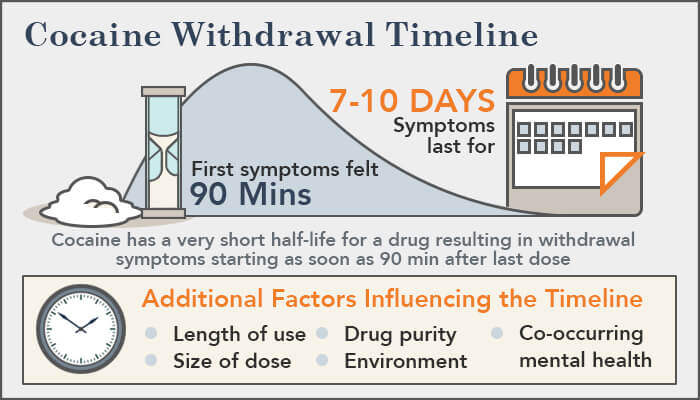Suddenly withdrawing cocaine from your system will result in dopamine levels plummeting to an uncomfortable low. The intense cravings to get high again depression and fatigue that are the hallmarks of cocaine withdrawal but due to deficient dopamine. Withdrawal from cocaine may produce symptoms of depression in some users. These symptoms can be expressed as low mood, low energy, and low motivation. Some people may report suicidal thoughts and intentions during withdrawal 3. Because of this, a detoxing individual should be monitored closely to keep them safe. Symptoms begin to subside until they are completely gone within 7 to 10 days. The one withdrawal symptom that may linger for weeks or months is the intense craving for cocaine. The most common withdrawal symptoms associated with cocaine are: anxiety, agitation, and depression. The first step on the road to recovery from cocaine addiction is withdrawing from the drug; this can be complicated process though thanks to the symptoms associated with it. While rarely life-threatening in and of itself, cocaine withdrawal is unpleasant and uncomfortable and can result in symptoms such as: intense cravings for the drug.
- Signs And Symptoms Of Cocaine Withdrawal
- Alcohol And Cocaine Withdrawal Symptoms
- Cocaine Withdrawal Symptom Management
- Cocaine Withdrawal Symptoms Pupils
- Cocaine Withdrawal Symptoms Uk Government
Cocaine timeline of withdrawal
Whether you use cocaine every day or binge for days then stop suddenly, the timeline of cocaine withdrawal consists of three different stages (1,3)

First stage of cocaine withdrawal timeline

This stage occurs within 24 hours of stopping using cocaine and lasts for around 7 days. Physical cocaine cravings will be at their most intense during this period of withdrawal.
Symptoms of the first stage of cocaine withdrawal typically include:
- Anxiety
- Depression
- Increased appetite
- Irritability
- Extreme fatigue
- Lack of motivation
- Cocaine cravings
Second stage of cocaine withdrawal timeline
The second stage of cocaine withdrawal can last anything up to ten weeks – without a medical cocaine detox.

Physically the person may start to feel better but this is when psychological symptoms can be at their worst.
Typical second stage symptoms include:
- Anxiety
- Lethargy and demotivation
- Mood changes
- Depression
- Difficulty concentrating
- Restlessness
- Dysphoria
- Cocaine cravings
Third stage of cocaine withdrawal timeline
The third and final stage of cocaine withdrawal can last for up to 6 months after quitting cocaine. Whilst the vast majority of symptoms will now have dissipated, third stage cocaine withdrawal symptoms include:
- Depression
- Mood changes
- Some cravings for cocaine
The first, second and third stage of cocaine withdrawal is likely to be more evident in those that have suffered a heavy cocaine addiction and have stopped suddenly without medical and therapeutic treatment.
Those that do not undergo professional cocaine treatment are far more susceptible to developing Post Acute Withdrawal Syndrome (Paws). Paws stage consists of third stage symptoms that can come and go for up to a year, sometimes longer (4)
The situation regarding cocaine use in the UK is not good from a health and wellbeing perspective.
- The UK is the cocaine capital of Europe
- The purity of cocaine at street level has reached its highest level in a decade - purity has risen to 80% plus in some places.
- Scientific tests by Kings College, London suggest users in London are snorting almost 200,000 lines of cocaine, equivalent to 23kg, every day, worth some £700,000 daily at current street prices. Other big cities like Birmingham, Liverpool and Bristol have similar problems.
- The number of cocaine-related hospital admissions in the UK has increased by 114% in the past five years
Giving up cocaine after prolonged use can be extremely difficult because the body is so used to functioning with the substance, which is why professional help is so successful in this quest. However, despite the escalating health risks its use is still seen as relatively risk free – which it's certainly not.
Cocaine Comedown Symptoms - Cocaine Timeline of Withdrawal
Cocaine is a stimulant, either in the form of crack/rocks or in its powder from. It’s absorbed quickly by the body, but it wears off quickly too. The short-term effects of cocaine do not last long. Snorting cocaine will produce a high that lasts about 45 to 90 minutes. Orally using the drug leads to a high that lasts about 90 minutes. The high from smoking crack or injecting it intravenously only lasts about 15 to 20 minutes. Whether you use cocaine every day or binge for days then stop suddenly, the timeline of cocaine withdrawal consists of three different stages
First Stage of Cocaine Withdrawal Timeline – The Crash
This stage occurs within 24 hours of stopping using cocaine and lasts for several days. For those that are using a lot the crash can go on for 7 days or so. During this stage cocaine cravings can be very intense, and many people end up using again because of this & so the cycle repeats.
The sort of issues individuals face during a crash are:
- Anxiety -This is often experienced alongside the cravings. In fact, the cravings can trigger anxiety and anxiety can trigger cravings, creating a vicious cycle which often leads to using to just stem this.
- Depression - This can be experienced as an overall sense of despair and for some this can lead to suicidal thoughts. Also, cocaine demolishes the natural enjoyment chemical releases in the brain. This can cause the frequent cocaine user to be unable to experience pleasure and joy or find usually enjoyable things bland or boring.
- Hunger - Cocaine dampens the appetite, so being ravenously hungry after using is quite common
- Cognitive problems - such as trouble concentrating, confusion, and short-term memory problems.
- Irritability – Short temperedness is a common feature, partly fuelled by the lack of proper sleep
- Extreme fatigue and sleep issues – Cocaine is a stimulant so long nights and early mornings are a common feature when using and as such sleep and proper rest goes out the window. However restlessness is also a withdrawal symptom and can stop someone desperately needing the sleep they need. This again creates a vicious cycle.
- Lack of motivation - This lack of motivation can be dangerous because it can make withdrawals seem impossible and feed into feelings of depression. And of course, feelings of lack of motivation often trigger more cocaine cravings.
- Cocaine cravings - One of the first things to experiences is an impulsive and intense craving to use again and, in many cases, this creates a binge pattern that is difficult to break without professional help.
- Dehydration: - Cocaine withdrawals can cause dehydration.
- Intense dreams & nightmares: If sleep is achieved then vivid and extremely unpleasant dreams are often a feature.
- Dangerous physical symptoms - There is also the risk of experiencing potentially dangerous physical symptoms, including tachycardia, arrhythmia, dehydration, trembling, seizures, and heart attacks. With purity levels being so high seizures and heart attacks have become more common.
- Flu like symptoms – especially after a heavy session.
Second Stage of Cocaine Withdrawal Timeline – The Withdrawal
This part of the withdrawal timeline, often call distinction, can last for about 4 weeks but in some cases, It can drag on for up to 10 weeks and many of the symptoms experienced in the crash will carry over, albeit on a reduced intensity
Typical second stage symptoms include:
- Anxiety
- Lethargy, demotivation
- Irritability and fluctuations in mood
- Depression and generalized dissatisfaction with life
- Cognitive problems, particularly difficulty in concentrating
- Sleep issues and restlessness
- Cocaine cravings
Third Stage of Cocaine Withdrawal Timeline - Extinction
The third sage of withdrawal is also referred to as the “extinction” phase and can last up to 6 months after someone’s last use. During this time, managing cravings without professional help is extremely difficult. Many cocaine users will relapse into old behaviour patterns as they haven’t dealt with the underlying reason of their use or had professional help to create a comprehensive relapse prevention plan or to work out their triggers and create strategies to deal with their cravings.
Whilst many withdrawal symptoms will now have dissipated, third stage cocaine withdrawal symptoms include:
- Depression
- Mood swings, including sustained irritability
- Cravings for cocaine
Signs And Symptoms Of Cocaine Withdrawal
Managing a Cocaine Comedown
The following is a list of things that will help in the initial stages of managing a come down:
- Keep fluid intake up, especially water or orange juice as is replenishes vitamin C or an isotonic drink.
- Taking 5-HTC has been known to be helpful. 5-HTP is a supplement and has been used with success to restore serotonin levels
- Eat – Eat a balanced diet, you need to replenish your energy levels. Bananas are great. Other than being rich in vitamin B6, bananas are a good source of vitamin C, dietary fibre, potassium, and manganese.
- Stress management/relax – Apps like Calm or Headspace are great to use for mindfulness and meditation aids. Warm baths with lavender scented products or essential oils is a great way to wind down especially if you have a Calm exercise going on in the background.
- Rest – Take some time out to let your body restore itself. Crash on the sofa with a warm drink and comfy blanket.

Alcohol And Cocaine Withdrawal Symptoms
Can Medication Help?
Attempts to develop a medication specifically for the use of minimizing withdrawals or reducing cravings for cocaine have been unsuccessful to this point.
Giving up cocaine after prolonged use can be extremely difficult because the body is so used to functioning with the substance. Dealing with the come down is one thing but learning to stop and stay stopped is another. Long term cocaine use will ultimately negatively affect the body and mind and in some cases, it is fatal and there is no chance of getting on top of it at that point. In some respects, cocaine use is akin to Russian roulette – you are never quite sure whether the next line will tip you over.
If you are concerned about your cocaine use, or someone else’s, and want to know what the options are for stopping and staying stopped then call us now on 0208 191 9174 or jump onto Live Chat/email us directly at https://helpmestop.org.uk/contact-us
Help Me Stop’s intensive non-residential outpatient Dayhab programme is an effective solution that also offers 12 months of free accessible aftercare and family support options. Treatment is delivered face to face either in the mornings or afternoons over 6 weeks.
Cocaine Withdrawal Symptom Management
For those adults who are working and can’t access services in the day or get to our centre in West London we offer a 6-week evening online outpatient drug and alcohol treatment programme, run by the same therapists that provide the face to face programme.
Chris Cordell is Help Me Stop's General Manager and is a senior associate member of the Royal Society of Medicine, Certified International Recovery Specialist, member of the International Society of Addiction Medicine and a member of the Federation of Drug and Alcohol Professionals.
Cocaine Withdrawal Symptoms Pupils
For news and updates on alcohol and drug problems, sign up to our newsletter:
Cocaine Withdrawal Symptoms Uk Government
If you have a problem with alcohol or drugs, or know someone who does, contact us for free, confidential advice:
